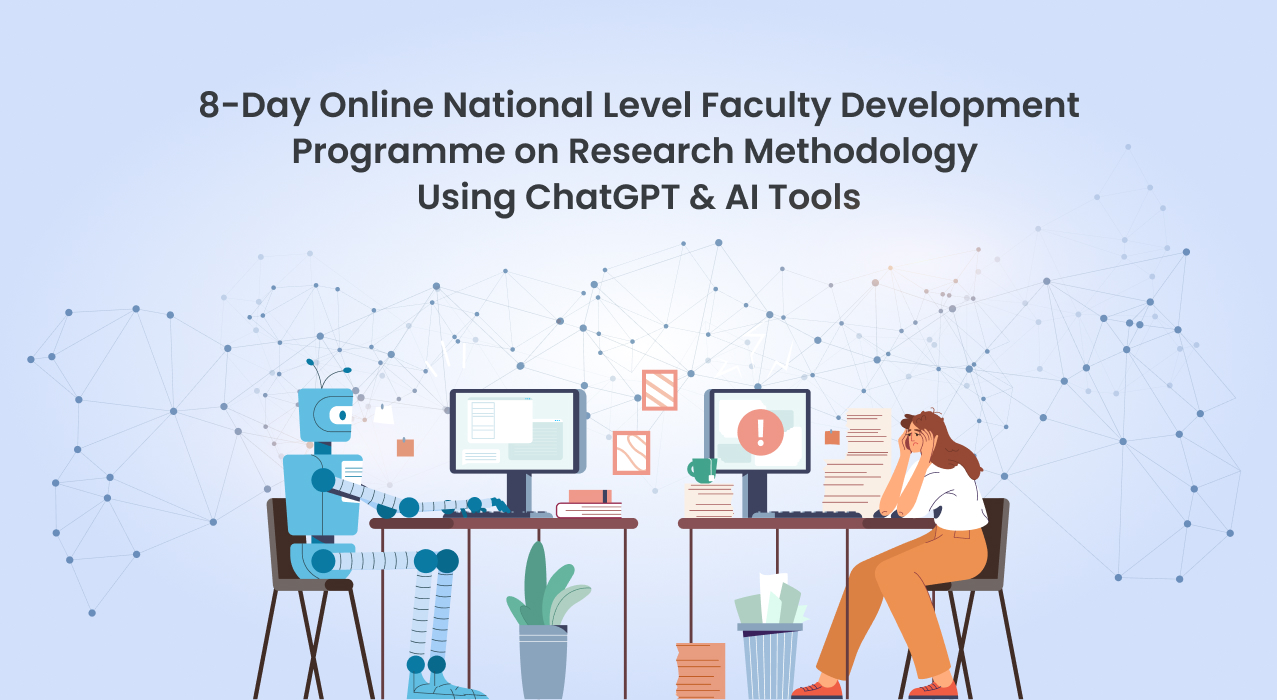
In today’s rapidly evolving academic environment, the practical application of advanced research methodologies and emerging technologies is imperative to foster knowledge dissemination and innovation. Recognising this imperative, The PG Department of Computer Applications, The Internal Quality Assurance Cell (IQAC) and The Lincoln University College Marian Research Centre (LUC MRC) of Marian College Kuttikkanam, Autonomous, in association with the Kerala State Higher Education Council curates a dynamic and enriching program that empowers educators and researchers with the tools and knowledge essential for conducting impactful research in the digital era. This comprehensive eight-day program will delve into the depths of research methodology, elucidating the latest trends, techniques, and strategies while emphasising the integration of AI Tools and ChatGPT to elevate research endeavours.
This collaborative endeavour promises to be a transformative experience for all participants as we engage in an enlightening exploration of research methodologies enriched with AI-driven insights. This program aims to equip educators and researchers with the skills and knowledge required to navigate the evolving research landscape effectively.
Together, we aspire to nurture a community of educators and researchers who are well-equipped to harness the potential of AI in research and pave the way for a future where research endeavours are driven by data-driven insights and powered by the capabilities of AI and ChatGPT.
Highlights of the FDP:
Brochure:
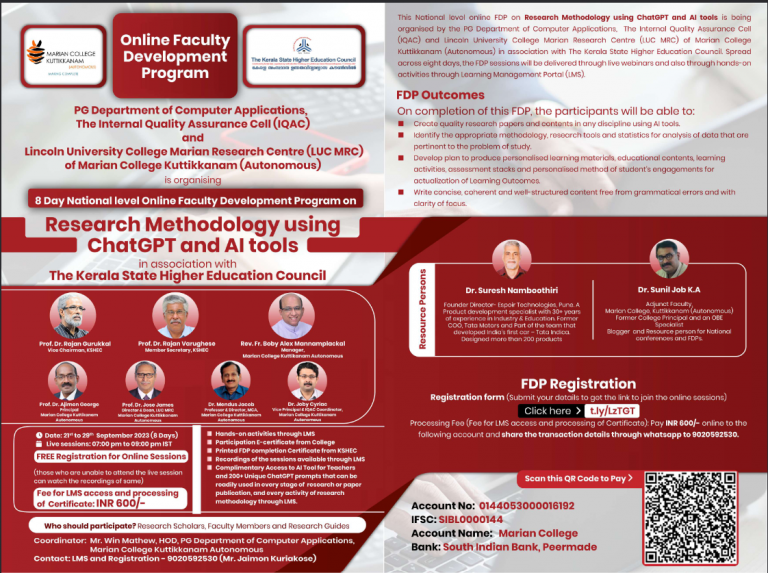
Resource Persons for the Faculty Development Program:
Dr Sunil Job KA:
 A resource person for several FDPs in OBE, Data Science, E-Learning etc., Dr Sunil has served as a Visiting Team Member of NCTE for ‘Grant of Recognition’ and as a resource person for the Affiliation Renewal Committee of MG University.
A resource person for several FDPs in OBE, Data Science, E-Learning etc., Dr Sunil has served as a Visiting Team Member of NCTE for ‘Grant of Recognition’ and as a resource person for the Affiliation Renewal Committee of MG University.
Dr Suresh Namboothri:
 The Founder Member of Espoir Technologies Pune. A well-known resource person for FDPs on OBE, Critical and Creative Thinking, Dr Suresh Namboothiri, a designer and developer of 200+ products with over 30 years of industry experience, is also the founder of Espoir Technologies, Pune. He has worked with engineers from 8 countries.
The Founder Member of Espoir Technologies Pune. A well-known resource person for FDPs on OBE, Critical and Creative Thinking, Dr Suresh Namboothiri, a designer and developer of 200+ products with over 30 years of industry experience, is also the founder of Espoir Technologies, Pune. He has worked with engineers from 8 countries.


Day 1: 21 September 2023
Inaugural Function:
The first-day session of the 8-day Faculty Development Programme on Research Methodology Using ChatGPT and AI Tools, organised by the PG Department of Computer Applications, the Internal Quality Assurance Cell (IQAC), and Lincoln University College Marian Research Centre (LUC MRC) of Marian College Kuttikkanam, Autonomous, in association with the Kerala State Higher Education Council (KSHEC), commenced at 7.00 PM on the 21 September 2023.
The welcome speech and the introduction about the Faculty Development Program were given by Dr Mendus Jacob, Director, MCA, Marian College Kuttikkanam, Autonomous and CEO of ipsr Solutions Limited.
The Inaugural and Official Address was delivered by Dr Jose James, Dean and Director of Lincoln University College Marian Research Centre, Marian College Kuttikkanam, Autonomous. During his career, he has also served as Director-Academics with Universal Empire Group India and Island Development Company of Maldives, as Chief Technical Coordinator and Director-Logistics with the National Games organising Committee, Kerala, and as Registrar with Director School of Physical Education and Sports Sciences.
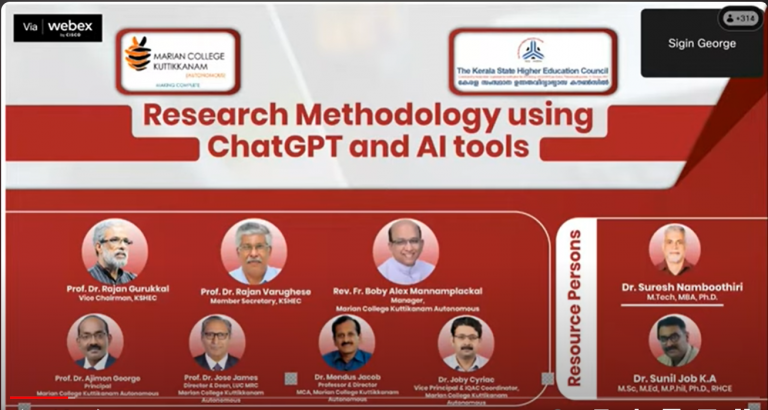
The Word of Thanks was delivered by Dr Joby Cyriac, the Vice-Principal and Coordinator of the Internal Quality Assurance Cell (IQAC), Marian College Kuttikkanam, Autonomous. In his speech, Dr Joby Cyriac specifically thanked the members of the Kerala State Higher Education Council for the relentless support and patronage offered. He also thanked Dr Jose James for the inaugural address, Resource Persons, Dr Suresh Namboothiri and Dr Sunil Job, all the administrative staff and members of Marian College, and most importantly, the participants for their interest and enthusiasm for joining the eight-day Faculty Development Program.
Click on to watch the inaugural session of the eight-day Faculty Development Program Research Methodology Using ChatGPT and AI Tools organised by the PG Department of Computer Applications, Internal Quality Assurance Cell (IQAC) and Lincoln University College Marian Research Centre (LUC MRC) of Marian College Kuttikkanam, Autonomous in association with the Kerala State Higher Education Council (KSHEC).
Day 1: Technical Session:
An exciting and informative session on how to use ChatGPT in a unique manner suited to our requirements by proper usage of prompts was taken by Dr Suresh Namboothiri after the inaugural session. In his session, Dr Suresh explained in detail the danger of not using Generative AI in the current situation, the myths and things people fail to understand regarding ChatGPT or Generative AI, how to approach ChatGPT for research, how helpful AI Tools for High-Impact research, How Custom Prompting avoids Plagiarism and helps to achieve originality etc.
Queries and doubts raised by the participants were cleared by the resource person before the conclusion of the session.
Click to watch the day-1 session of the 8-day Faculty Development Program on Research Methodology Using ChatGPT and AITools by Dr Suresh Namboothiri.
Day 2: 22 September 2023
The resource person for the second-day session of the Faculty Development Program on Research Methodology using ChatGPT and AI Tools was Dr Sunil Job on the topic Foundation on Research Methodology.
Click to watch the Day 2 session of the 8-day Faculty Development Program on Foundation on Research Methodology by Dr Sunil Job KA.
Multiple Choice Question Papers – Part 1, based on Research Methodology were assigned to the participants to understand the depth of knowledge they acquired during the session.
Day 3: 23 September 2023
Dr Suresh Namboothiri, the resource person for the third day of the Faculty Development Program provided valuable information to the participants during his two-hour session on the topic of Prompt Engineering.
During the two-hour session, Dr Suresh explained in detail the significance of prompt engineering, how to provide quality questions to get quality answers while using ChatGPT, what procedures must be followed to get superior results while using AI, the magic prompt formula, different types of prompts etc
All doubts regarding the topic discussed during the session were cleared before the conclusion of the session.
Click to watch the day-3 session of the 8-day Faculty Development Program on Prompt Engineering – Part 1 by Dr Suresh Namboothiri.
Multiple Choice Question Papers – Part 2, based on Prompt Engineering were assigned to the participants after the day- three session.
Day 4: 25 September 2023
The fourth-day session of the eight-day Faculty Development Program handled by Dr Suresh Namboothiri was the continuation of day three on the topic of Prompt Engineering.
The session started with a recap of the previous day’s topic and proceeded with Interpretable Soft Prompts, Controlled Generation Prompts, Targeted Question-Answering Prompts, Summarisation Prompts, Reflexion: An Interactive Approach to Problem-Solving, Reinforcement Learning Prompts etc.
The session concluded with the clearance of doubts from the participants.
Click to watch the day-4 session of the 8-day Faculty Development Program on Prompt Engineering – Part 2 by Dr Suresh Namboothiri.
After the conclusion of the session, Multiple Choice Question Papers – Part 3, based on the session Prompt Engineering – Part 2 were assigned to check the depth of knowledge the participants have gained by attending the program.
Day 5: 26 September 2023
Dr Suresh Namboothiri, the resource person for the fifth day of the Faculty Development Program started the session based on the topic Research Methodology With ChatGPT. In the informative session, Dr Namboothiri explained in detail the 10-step process for Hi-Impact Research using Generative AI.
The points discussed included, How can AI help build the pre-requisites for hi-impact research, Critical thinking – a common success factor for research and AI, Formulating a research problem, Conceptualising a research design, Constructing instruments for data collection, Selecting samples, Writing a research proposal, Collecting data, Processing and displaying data, and finally, How to write a research report.
On day 5, Dr Namboothiri explained the first four points in detail and cleared the doubts of the participants.
Click to watch the day-5 session of the 8-day Faculty Development Program on Research Methodology with ChatGPT – Part 1 by Dr Suresh Namboothiri.
The session concluded after the participants were assigned Multiple Choice Question Papers on Research Methodology – Part 1 to analyze the depth of knowledge they have acquired through the session.
Day 6: 27 September 2023
The day-6 session taken by Dr Suresh Namboothiri was the second part of the topic Research Methodology With ChatGPT taken on day 5.
During the informative session, the resource person Dr Suresh Namboothiri provided valuable insights into the research methodology by explaining the key principles and techniques used in conducting systematic and rigorous research. He explained in detail the steps involved in designing research studies, selecting appropriate data collection methods, and analyzing data effectively.
As in the previous days, the question and answer session followed the informative two-hour session by Dr Namboothiri.
Click to watch the day-6 session of the 8-day Faculty Development Program on Research Methodology with ChatGPT – Part 2 by Dr Suresh Namboothiri.
Multiple Choice Question Paper based on Research Methodology with ChatGPT was assigned to the participants as a task after the completion of the interesting session.
Day 7: 28 September 2023
Dr Suresh Namboothiri continued the day-7 session with the topic Research Methodology with ChatGPT – Part 3. During the session, he guided the participants in formulating a research problem by helping them define a clear and specific research question, identify relevant variables, and establish its significance. He assisted in creating a research design by outlining the research approach – qualitative, quantitative, or mixed methods, data collection methods, and data analysis techniques.
The doubt clearance session followed the technical session and Dr Suresh promptly cleared the doubts of all the participants who put forth a question.
Click to watch the day-7 session of the 8-day Faculty Development Program on Research Methodology with ChatGPT – Part 3 by Dr Suresh Namboothiri.
As in previous days, a Multiple Choice Question Paper was assigned to the participants to understand their level of knowledge in the subject.
Day 8: 29 September 2023
The final day session had four parts, the technical session by Dr Suresh Namboothiri on the topic of Research Methodology with ChatGPT -Part 4, the Introduction of “QuestionPaper.ai”, Valedictory Message and finally the Word of Thanks.
Dr Suresh Namboothiri concluded the remaining steps from the previous day’s session where he provided insights into constructing research instruments such as surveys or questionnaires, ensuring they are valid and reliable. He also provided information on selecting appropriate samples, to ensure the research’s representativeness and reliability.
Introduction of QuestionPaper.ai:
After the informative session by Dr Suresh Namboothiri on Research Methodology with ChatGPT, Dr Sunil Job had the introduction of “QuestionPaper.ai” – a powerful tool with a user-friendly interface and incorporated multiple features to streamline the process of question paper generation.
Salient Features:
The versatile template system allows educators to create customized templates to suit their specific requirements and the gallery of quick templates allows quick question paper generation. The copy, modify and archive facility ensures efficiency and consistency in question paper design. The system can effortlessly generate questions from any topic or discipline and at various levels of Bloom’s Taxonomy and the educators have the flexibility to edit, regenerate, and modify questions ensuring uniqueness in each paper and tailored to their teaching objectives.
Being ‘Outcome Based Education’ friendly, the software enables users to input Course Outcomes (COs) and map each question to the respective COs ensuring alignment with curriculum goals and assessment standards. The software, apart from being economical in terms of time and cost, allows users to archive question papers for future reference, reducing the repetitive task of question paper creation. The tool excels in generating accurate answers facilitating the preparation of scoring keys and valuation schemes, and an invaluable resource for creating a diverse set of options and correct answers for multiple-choice questions, contributing to fair and efficient grading processes.
Dr Sunil Job introduced “QuestionPaper.ai” to the participants as a revolutionary tool designed to streamline the process of question paper creation in the realm of education. He mentioned that with this platform, educators will have the power to craft their templates by drawing from a diverse gallery of quick templates, efficiently generate question papers and that these templates can be copied, modified, and archived for future use, ensuring maximum flexibility. On mentioning question generation, Dr Sunil said what truly sets “QuestionPaper.ai” apart is its flexibility in generating questions from any topic, or discipline, or accommodating various levels of Bloom’s Taxonomy. He explained that one can input the full syllabus or topic-wise content effortlessly and fine-tune questions until it meets his/her satisfaction. He also mentioned that as the system is aligned with Outcome Based Education, it allows input of Course Outcomes and maps questions accordingly facilitating the assessment process. Regarding the cost-effectiveness of the software, Dr Sunil mentioned that it’s a time and cost-efficient solution as it lets to archive question papers for future reference, thereby saving valuable time. He also mentioned that “QuestionPaper.ai” aids in generating accurate answers for the questions generated, simplifying the preparation of scoring keys and valuation schemes, making it an indispensable tool for crafting multiple-choice questions with distracting options and correct answers. In his concluding words, Dr Sunil mentioned that this platform will be a game-changer for educators looking to enhance their efficiency in question paper creation and assessment.
After the introduction of “QuestionPaper.ai” software, doubts raised by the participants were cleared by the resource persons.
Valedictory Function:

The Valedictory message of the 8-day Faculty Development Program on Research Methodology using ChatGPT and AI Tools was delivered by Rev Fr Boby Alex Mannamplackal, Manager, Marian College Kuttikkanam, Autonomous. During his speech, Fr Boby expressed his gratitude to those who presented the future of Artificial Intelligence. He especially thanked the Kerala State Higher Education Council members for their guidance and support so that the results of this research can be shared among the faculty, academia and research persons across the globe.
Word of Thanks:
The Word of Thanks was given by Dr Brijesh George John, Associate Professor, PG Department of Computer Applications, Marian College Kuttikkanam, Autonomous. During his speech, Dr Brijesh thanked Rev Fr Boby Alex for his valedictory message and thanked Dr Suresh Namboothiri and Dr Sunil Job, the resource persons for the 8-day Faculty Development Program. Dr Brijesh also took time to thank Dr Mendus Jacob for taking the initiative to organise the program, the staff and management members of Marian College Kuttikkanam, Autonomous, Dr Jose James, Dean and Director of Lincoln University College Marian Research Centre, Marian College Kuttikkanam, Autonomous, The Kerala State Higher Education Council, especially Dr Rajan Gurukkal, the Vice Chairman and Dr Rajan Varghese, Member Secretary, all coordinators of the program, and especially the participants from all parts of India and abroad.
Mentimeter Feedback:





Feedback in a Nutshell:
Join us for FREE to get instant email updates!
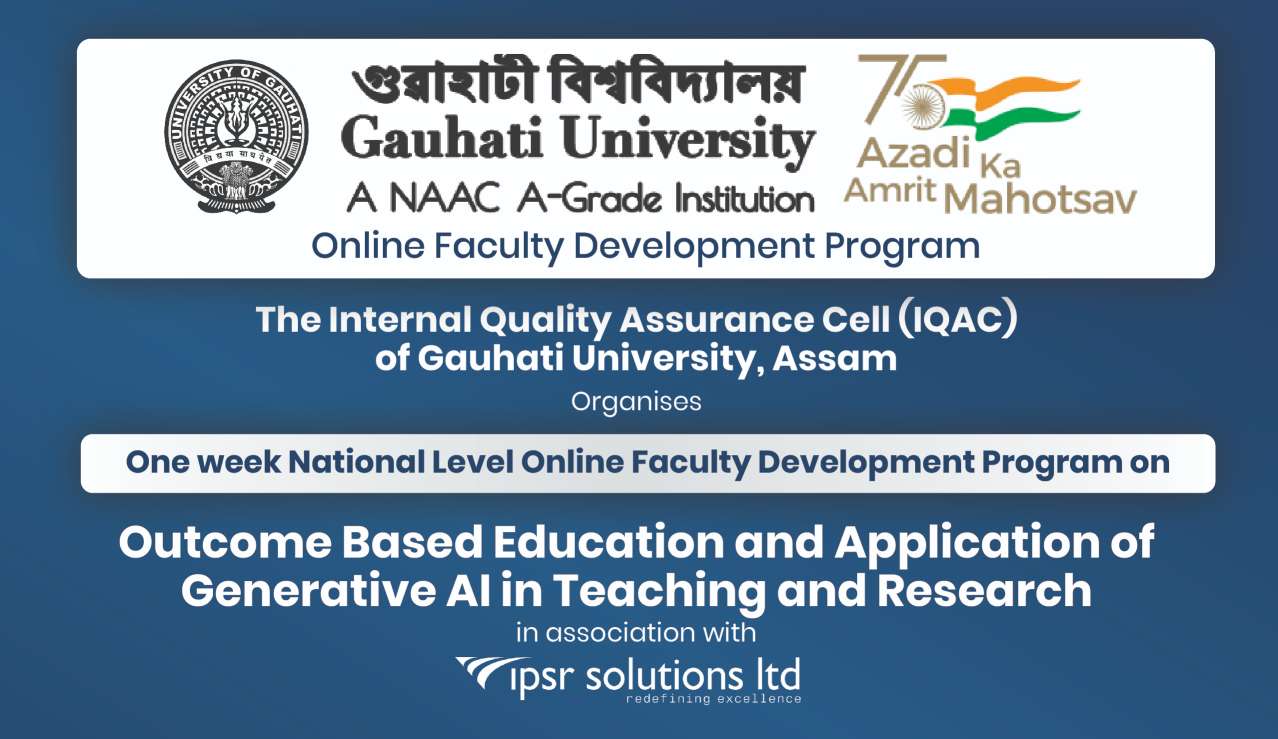
Introduction Outcome Based Education (OBE) has emerged as a transformative […]
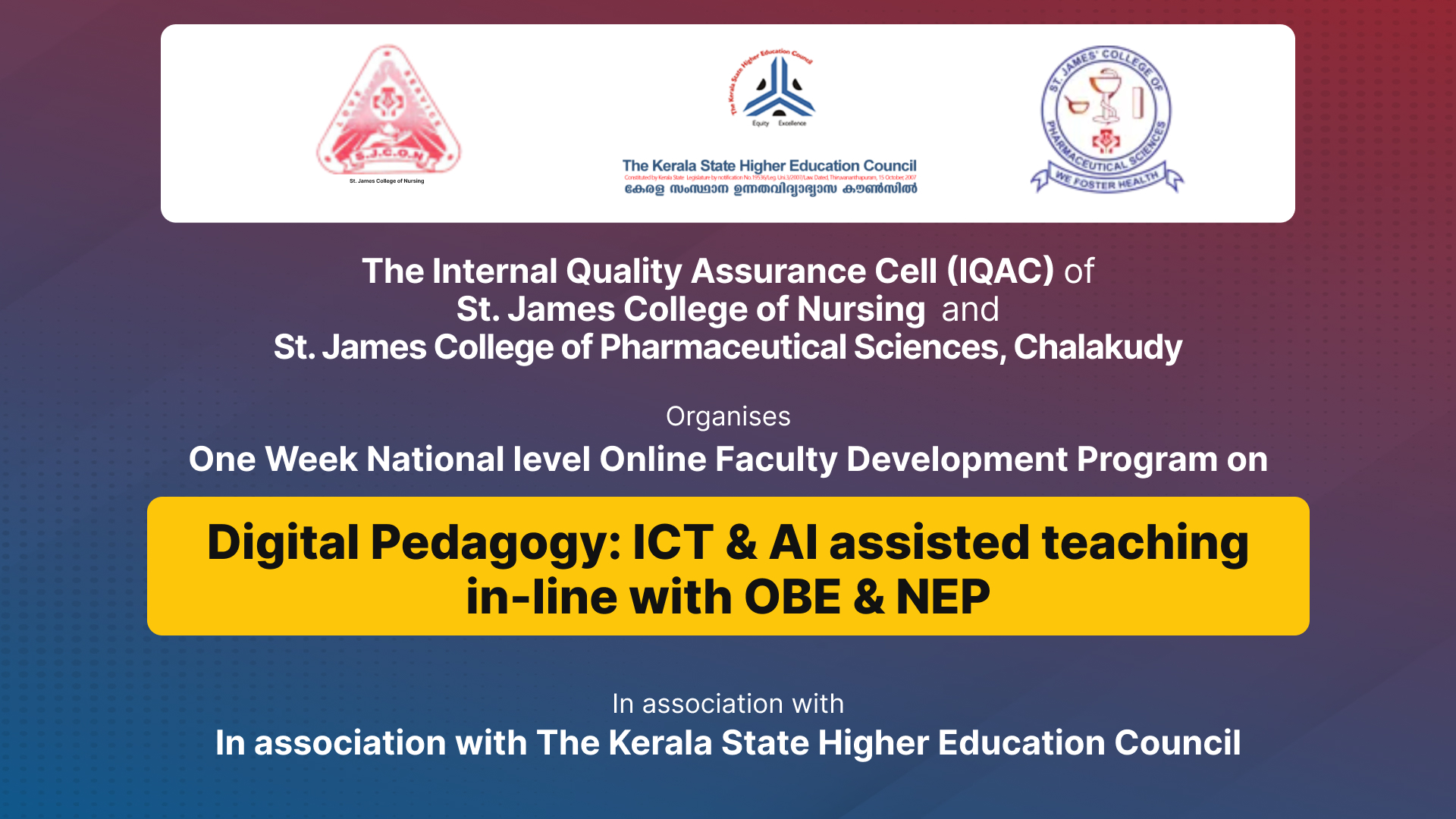
Introduction: In today’s rapidly evolving educational landscape, integrating Digital Pedagogy, […]
Leave A Comment